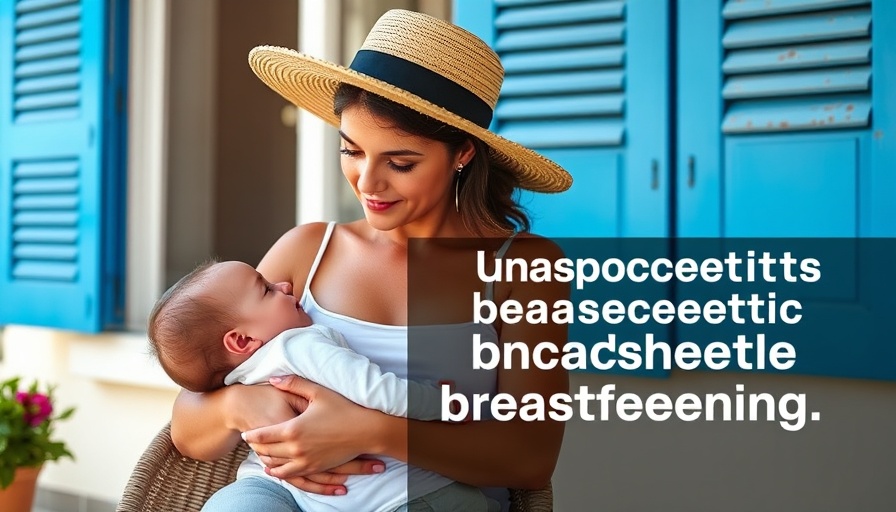
Why Unapologetic Breastfeeding Matters in Today's Society
In today’s fast-paced life, the conversation surrounding breastfeeding is more critical than ever. The act, often met with controversy and cultural stigma, has been a hot topic in motherhood discussions. The video Unapologetically Breastfeeding Because Motherhood is a No-Win Game Sometimes sheds light on the everyday realities of breastfeeding and challenges the societal expectations placed on mothers. It is essential to explore the implications of this practice, not only for the mother but also for society at large.
In Unapologetically Breastfeeding Because Motherhood is a No-Win Game Sometimes, the video presents essential insights into breastfeeding challenges, prompting us to delve deeper into the societal implications for mothers.
The Health Benefits of Breastfeeding
Breastfeeding is a natural and vital aspect of infant nutrition. A wealth of studies, including those from the World Health Organization, suggests that breastfeeding significantly reduces the risk of illness in infants and contributes positively to their long-term health. Mothers who breastfeed also benefit from reduced risks of certain cancers, diabetes, and postpartum depression. Understanding these health benefits can encourage mothers to overcome societal pressures and focus on what is best for themselves and their babies.
Social Pressures and the Reality of Motherhood
The narrative around motherhood often paints a picture of constant self-sacrifice and perfection. However, this expectation can lead to feelings of inadequacy in mothers, especially when it comes to breastfeeding. Many women face public scrutiny or lack familial support, which complicates their breastfeeding journey. The video serves as a reminder of the struggles faced by mothers and underlines the importance of creating a supportive community that allows mothers to nurse freely and without shame.
Counterarguments: The Diverse Perspectives on Breastfeeding
While breastfeeding remains the gold standard for infant nutrition, not every mother can or chooses to breastfeed due to a variety of reasons, including medical conditions or personal choice. It is essential to approach the dialogue surrounding breastfeeding by recognizing these diverse perspectives to avoid alienating mothers who bottle-feed. Instead, conversations should foster understanding and respect for each mother's journey, ensuring everyone feels empowered.
Relevance to Current Events: Breastfeeding in the Spotlight
In light of recent public health initiatives aimed at promoting breastfeeding, such as maternity leave policy changes and workplace support, the timing of discussions around breastfeeding could not be more relevant. Many campaigns are evolving to support breastfeeding mothers, and there is a growing recognition of the need for societal change to accommodate breastfeeding in public, reinforcing that mothers should not feel forced into silence or shame.
Unlocking Healthier Lifestyles through Nutrition
Promoting the connection between breastfeeding and long-term health can inspire a generation of healthy choices. Integrating healthy eating habits into daily life is essential. Initiatives like a Weekly Healthy Recipe Challenge could be a starting point for families to explore nutritious cooking options and better appreciate the importance of what they feed their children. Such challenges encourage families to cook together, experimenting with accessible ingredients for delicious and healthy meals.
Practical Insights: Creating a Supportive Environment
Building a nurturing environment for new mothers is crucial. This involves advocating for breastfeeding-friendly spaces, accessible nourishment, and educational programs that emphasize the importance of breastfeeding. Simple steps, like establishing 'mother zones' in public areas or supporting businesses that promote breastfeeding, can go a long way in making mothers feel respected and empowered.
Embracing the Journey of Motherhood
Motherhood is an evolving experience that includes a multitude of challenges, from feeding choices to emotional and physical health considerations. Embracing breast and bottle feeding as valid choices aids in painting a holistic view of motherhood, where empathy and understanding are foundational. Let us encourage one another through the complexities of parenting—every choice made is valid.
In conclusion, the video Unapologetically Breastfeeding Because Motherhood is a No-Win Game Sometimes encourages a candid discourse on the unrecognized struggles of mothers today. By fostering an inclusive atmosphere that emphasizes support and understanding, we can help nurture future generations. Join us in championing the voice of breastfeeding mothers and encourage new approaches in promoting their well-being.
Are you interested in exploring the world of healthy eating and recipes? Join our movement for vibrant health through nutrition. Stay tuned for more insights on how little changes can lead to significant impacts!
 Add Row
Add Row  Add
Add 




Write A Comment